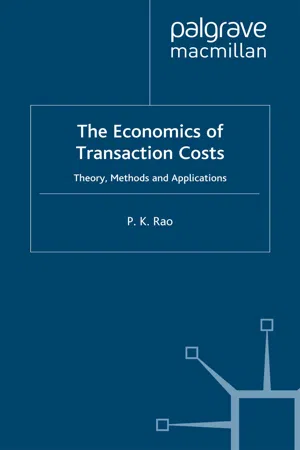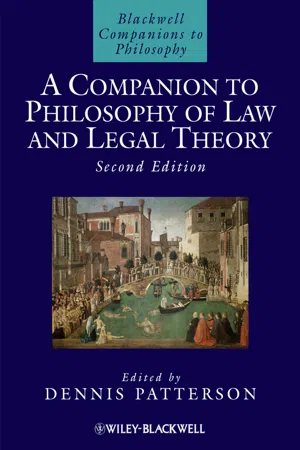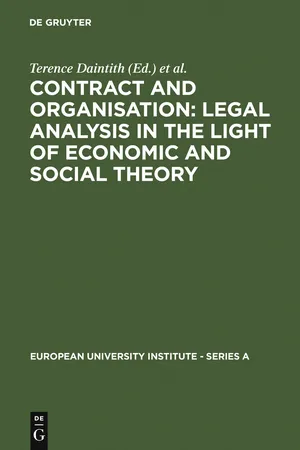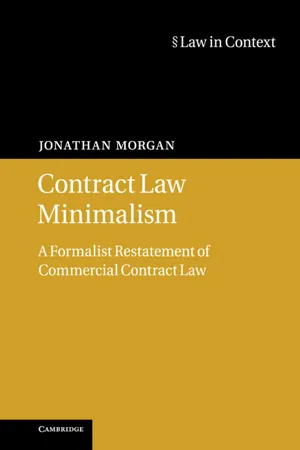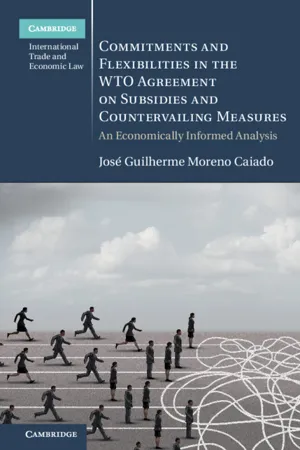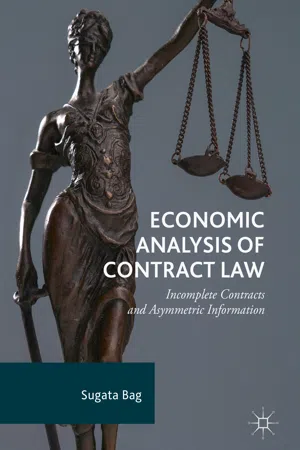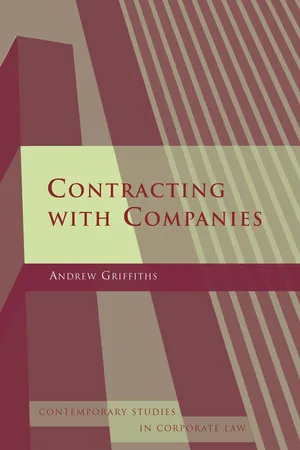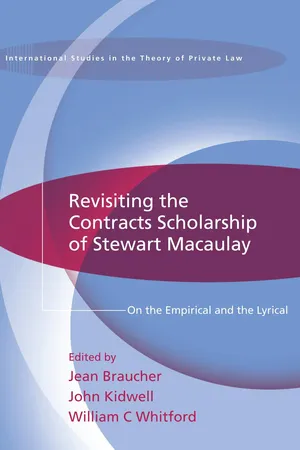Economics
Contract Theory
Contract theory in economics examines the design and implementation of agreements between parties to achieve mutually beneficial outcomes. It explores how contracts can align incentives, mitigate risks, and facilitate cooperation in various settings, such as employment relationships, procurement, and public-private partnerships. The theory considers issues like information asymmetry, moral hazard, and adverse selection to inform optimal contract design.
Written by Perlego with AI-assistance
Related key terms
1 of 5
10 Key excerpts on "Contract Theory"
- eBook - PDF
The Economics of Transaction Costs
Theory, Methods and Application
- P. Rao(Author)
- 2002(Publication Date)
- Palgrave Macmillan(Publisher)
Legal Contract Theory versus economic Contract Theory Legal Contract Theory advises (Schwartz, 1992, p. 76) `authoritative de- cision-makers how to regulate contracting behavior', procedurally and 124 Applications substantively, whereas economic Contract Theory focuses on the design of optimal contracts, assuming `rational parties' as the contracting parties) to be devised by various institutions. Despite widespread usage of different types of contracts, contracts literature in legal and economic arenas remains incomplete, and this explains the substantial utilization of the judicial institutions. A wide variety of categorizations of contracts is relevant for gaining greater insights. It is not as important to figure out the completeness or lack of it in contracts, because it is almost impossible to form a complete contract. The relevant issue is how incomplete contracts are, and to examine why some contracts are more complete than others. One contract is more complete than another if it gives a more precise characterization of the transaction and of the means of implementing it (Saussier, 2000b). A useful finding may be stated here: Proposition: The marginal cost of a contract that aims for complete- ness increases with the transaction-uncertainty level and the con- tract-completeness level (Saussier, 2000b, p. 193). It is useful to note that, in the complete contracts framework, optimal contracts can be specified contingent on all observable information, even after the original starting date of the contract. In contrast incomplete contracts are founded largely on the existence of unobservable and/or asymmetric information among contracting parties on the one hand, and third parties (for the purposes of verifiability or co-ordination) on the other. As pointed out by Saussier (2000a), non-verifiability feature remains an important provider of incompleteness in contracts. - eBook - PDF
Game Theory for Next Generation Wireless and Communication Networks
Modeling, Analysis, and Design
- Zhu Han, Dusit Niyato, Walid Saad, Tamer Başar(Authors)
- 2019(Publication Date)
- Cambridge University Press(Publisher)
The repeated 42 Contract Theory one needs to solve the problems that arise with the renegotiation and design of long-term contracting because of the impossibility of contracting parties to commit to long-term contractual agreements. The repeated iteration between the involved parties causes new incentive problems and thus produces more complexity compared to static contracting. Comparisons Market Equilibrium In a market equilibrium, a participant plays its own strategy in response to the actions of the other players, in each iteration, until they reach a market equilibrium. After repeated interactions and renegotiations, all parties can come to an agreement. Thus, we can see that the market equilibrium is equivalent to the repeated contracting model in Contract Theory, and different scenarios can be formulated as either adverse selection or moral hazard. Auction Theory In auction theory, usually there is one seller who has an item to sell and several bidders with reservation prices competing for this item. At the same time, in a multilateral adverse selection scenario, there are one seller and several buyers who have their own private information, which is the same case as the bidder’s reservation prices in auction theory. As a result, we see that there is a link between auction theory and the multilateral adverse selection contracting problem in Contract Theory. 3.1.2 Contract Theory: Reward Design In Contract Theory, the objective of an employer is to motivate employees by offering a reward, in trading with a level/quality of service, performance, outcome, or target. Consequently, whether the employees can be fully stimulated by the incentive mecha- nisms is largely dependent on the offered rewards. Observing a large number of formu- lations in Contract Theory, the reward design is different in various contracting scenarios. The design and classification of reward are shown in Figure 3.2 and will be elaborated in detail in this subsection. - Dennis Patterson(Author)
- 2010(Publication Date)
- Wiley-Blackwell(Publisher)
Even if economic analysis were to become complete in its own terms, it is doubtful that it could legitimately claim to be a theory of contract law as opposed to an economics of transactions. Concluding Remarks In my opinion, this gap between law and theory is the single most important charac- teristic feature of contract theorizing since Fuller. While the gap is arguably most explicit and therefore most visible in economic analysis, I have suggested that it is also present in different ways in every theory discussed, beginning with Fuller’s. And as I shall now indicate by way of conclusion, the resolution of this gap must be the first item on the agenda for future theoretical reflection about contract. Theoretical reflection about contract law presupposes an object given to us that embodies the legal point of view. That there is such a point of view, none of the authors discussed and certainly no lawyer will want to deny. The first task of theory, then, is to uncover and to present this point of view. A theory that fails to begin in this way condemns itself to being irrelevant as a theory of law. Accordingly, we must provision- ally set aside existing contract theories that are one step removed from this starting point and make a fresh beginning by examining the public legal culture of contract (judicial decisions, authoritative scholarly interpretations, and so forth) to see whether it yields a conception of contract that is at once coherent and provisionally plausible in contract 61 moral terms. More specifically, we look to well-established parts of contract doctrine and try to make explicit the basic normative ideas underlying them. On this basis, we attempt to construct a conception of contract that fits best and that is normatively acceptable.- eBook - PDF
Contract and Organisation
Legal Analysis in the Light of Economic and Social Theory
- Terence Daintith, Gunther Teubner, Terence Daintith, Gunther Teubner(Authors)
- 2011(Publication Date)
- De Gruyter(Publisher)
The Use of Economics to Elucidate Legal Concepts: The Law of Contract DONALD R . HARRIS CENTO G . VELJANOVSKI Oxford Introduction The purpose of this paper is to illustrate the value to lawyers of using economic perspectives to obtain a deeper understanding of the law. 1 There is some affinity between economics and law which often makes collaboration between econom-ists and lawyers easier than between lawyers and other social scientists. Lawyers have, often without knowing it, been forced to face many economic issues when developing legal principles, and their discovery of economic theory frequently enables them to perceive more clearly issues of which they were only dimly aware. Economic theory can give lawyers an external view of the law, a new perspective from which to appraise the law. But there are limitations to the economic viewpoint, which normally assumes the existing distribution of wealth and income. Legal rules must often take account of concepts of justice ('fairness') and ethical standards, which are factors beyond those used by economists; nevertheless, lawyers should still benefit from the insights of economics - they may see more clearly the situations in which they are allowing distributive justice to override economic efficiency. This paper will take its illustrations from the law of contract; all legal systems must have a set of rules to govern the making and enforcement of agreements, and we hope that much of what we say about the English law of contract will have parallels in the law of contract in other legal systems. We consider in turn various economic approaches to contract law. 2 1 For a general introduction to the law-and-economic literature see Posner (1977); Veljanovski (1982); Bowles (1983); Polinsky (1983). 2 The economic literature on contract and contract law is now vast. - eBook - PDF
Contract Law Minimalism
A Formalist Restatement of Commercial Contract Law
- Jonathan Morgan(Author)
- 2013(Publication Date)
- Cambridge University Press(Publisher)
Part II Social sciences and the law of contract The following three chapters consider the analysis of contract law and con- tracting from economic, social and other non-doctrinal perspectives. The aim is in part descriptive: to introduce the debates to a wider audience of legal scholars, for in England ‘the blackletter man’ still remains ‘the man of the present’. 1 But the main concern is with features that may be surprising. Increasingly, psychological, sociological and even some economic research emphasizes the importance of trust and co-operation in contracting. This challenges the assumptions that underlie both neoclassical economics and traditional contract law. Contracting parties seem neither as ruthlessly self- interested, nor as calculatingly rational, as has often been assumed. The focus is upon those findings. Having outlined this research, the really difficult question is what to make of it. The full answer must await Part III and the major argument of this book. But some caveats should be sketched at the outset. The natural reaction is to assume that, as the behavioural assumptions underlying traditional contract law and economics have changed, then so must those traditional accounts. Specifically, that to achieve economic efficiency and meet contracting parties’ reasonable expectations, flexible co-operative norms must replace the strict and amoral rules familiar to common lawyers. But there is good reason to resist this conclusion, however familiar the pattern of reasoning. As we seek to show in these three chapters, the various critical approaches bring accuracy through considerable sacrifice of determinacy. This is true whether the aim is to measure transaction costs, to model decision-making heuristics and bounded rationality, to identify social norms, or to define relational contracts. It is highly likely that any legal decision-maker attempting to do this will fall into error. - eBook - PDF
Commitments and Flexibilities in the WTO Agreement on Subsidies and Countervailing Measures
An Economically Informed Analysis
- José Guilherme Moreno Caiado(Author)
- 2019(Publication Date)
- Cambridge University Press(Publisher)
The economic study of contracts has long been object of law and economic theory. See, for instance, Cooter and Ulen, Law and Economics p. 276. For a discussion about the analogy about contracts and treaties, see Trachtman, The Economic Structure of International Law p. 120–2. 7 Daniel M Hausman, “Philosophy of Economics” in Edward N Zalta (ed), The Stanford Encyclopedia of Philosophy, vol Winter 2013 (The Stanford Encyclopedia of Philosophy, Stanford University 2013). 8 Ibid. 9 Ibid. 10 For an overview, see Pauwelyn, Optimal Protection of International Law p. 16–25. 11 See, for instance, Larry A DiMatteo and others, Visions of Contract Theory: Rationality, Bargaining, and Interpretation (Carolina Academic Press 2007) p. 35–47. int ’l law and economics and rational choice 19 Another criticism is that rational choice theory does not have adequate tools to deal with state preferences that cannot be monetized, such as national security. 12 While some rationalist scholars do work with the monetization of preferences, others prefer instead to apply a cost and benefit analysis that encompasses the interests of a wide range of domes- tic groups, thus taking into consideration concerns other than purely “monetized” values. 13 Finally, rationalist approaches arguably suffer from a certain ambigu- ity regarding how they deal with the preferences of decision-makers who, although they might be concerned with overall welfare, could also be interested in increasing the welfare of the leaders of their home state, or even fostering their own interests. 14 The development of public choice analysis in international legal research, however, increasingly offers tools that can be used to understand and address the roles of domestic interest groups and the influence that they exercise over policymakers. These criticisms, while relevant, seem somewhat exaggerated and the use of rationality has proven so far to be a valuable tool for legal scholars. - eBook - ePub
Economic Analysis of Contract Law
Incomplete Contracts and Asymmetric Information
- Sugata Bag(Author)
- 2018(Publication Date)
- Palgrave Macmillan(Publisher)
© The Author(s) 2018 Sugata Bag Economic Analysis of Contract Law https://doi.org/10.1007/978-3-319-65268-9_2Begin Abstract2. Basics of Economic Theory of Contract
End AbstractSugata Bag1(1) Department of Economics, Delhi School of Economics, Delhi, India2.1 Introduction
The organisation of market and the institutions in many ways govern economic relationships and contracts. And any discussion of contract law, without the understanding of the basic mechanism of contracts would be futile. Therefore, in this chapter, we revisit the basics of economic theory of contracts to focus on models that take into account the full complexity of strategic interactions related to trade between two privately informed agents in well defined institutional settings.We encompass various aspects of contracting through the simple design of a multi-task model of contracts. The model will allow us to sum up the constraints imposed by the prevailing institutional setting through a contract. The present model will set the basic analytical framework for the rest of the book. The lessons drawn from the analysis here will be integrated into the economic analysis of contract laws carried out in later chapters.In the course of this chapter we shall explore: the need for contracts under various market modes; how market institutions and incomplete information play a role; what kinds of contract parties enter into under different market and informational set-ups; how these contracts help parties to reap the gains from trade; and what kinds of incentive are being provided under different contracting scenarios.The analysis in this chapter will highlight the canonical hold-up problem, which is a central issue in a bilateral trading set-up. The main focus throughout the analysis will based on situations where the asymmetries of information develop subsequent to initiating a formal trading relation (through non-verifiability). We shall also analyse the agency problems with renegotiation, asking when it is possible to give an agent the efficient incentive to work on an asset or project that a principal will directly use or sell in the up-market. The courts can only verify (1) payments between the parties, (2) the possession (ownership) of the asset or project, and (3) the contractually binding statements such as offer, acceptance or the exercise of an option. Throughout this chapter, our maintained assumption is that trade is always feasible and profitable despite uncertainty . So the role of contract laws can be limited to the settlement of disputes or - eBook - PDF
- Andrew Griffiths(Author)
- 2005(Publication Date)
- Hart Publishing(Publisher)
The term ‘nexus of contracts’ is associated in par-ticular with M Jensen and W Meckling, ‘Theory of the Firm: Managerial Behaviour, Agency Costs and Capital Structure’ (1976) 3 Journal of Financial Economics 305. The reference to ‘con-tracts’ does not mean the strict legal sense of the word, but rather indicates the broad rela-tionships between a company and each of its major groups of stakeholders, including that with its shareholders. These relationships may include contracts in the strict legal sense, but may also have other components such as the legal features of the company itself, rules of company law, various pieces of legislation, collective arrangements involving the relevant group (such as that effected through the UK Listing Authority’s Listing Rules ) and any regu-lation applicable to the particular relationship in question. These relationships are referred to as ‘contracts’ because they are generally voluntary. To emphasise the distinction from con-tracts in the strict legal sense, this economic presentation of the company has also been termed a ‘nexus of treaties’, but this expression is not widely used: see M Aoki, B Gustafsson and O Williamson (eds), The Firm as a Nexus of Treaties (London, Sage, 1990). 103 See, for example, R Coase, ‘The Nature of the Firm’ (1937) 4 Economica NS 386; A Alchian and H Demsetz, ‘Production, Information Costs and Economic Organization’ (1972) 62 American Economic Review 777; E Fama and M Jensen, ‘Separation of Ownership and Control’ (1983) 26 Journal of Law & Economics 301; and E Fama and M Jensen, ‘Agency Problems and Residual Claims’ (1983) 26 Journal of Law & Economics 327. The economic analysis of the com-pany is largely based on neo-classical analysis, although there are neo-institutional variants: see W Bratton, (1989) 41 Stanford Law Review 1471 and W Bratton, (1989) 74 Cornell Law Review 407. - eBook - PDF
Regulating Enterprise
Law and Business Organisation in the UK
- David Milman(Author)
- 1999(Publication Date)
- Hart Publishing(Publisher)
See A. Ogus, Regulation: Legal Form and Economic Theory (Oxford, Clarendon Press, 1994). 24 Explanation given by Ogus, see n. 23 above, 24, who immediately points out that there is no requirement for the gainers to compensate the losers; see below in the criticism section. 25 I. Ayres and J. Braithwaite, Responsive Regulation (Oxford, OUP, 1992), 23. Applying market economics to company law involves seeing the company not as a free-standing institution but as a network of bargains between all involved, all acting rationally with perfect information. The utility of company law is to prevent the high costs of reaching individual bargains with every involved person. Company law thus reduces transaction costs. CRITICISM OF CONTRACTUAL THEORIES The economic contractualist attracts criticism both at the level of the concep-tion of companies and company law and on the basis of the perceived political results of the analysis. The former are criticisms which go to the utility and accuracy of the analysis itself. Further problems may arise when the economists view the company in action and designate the interaction between the company and the state (the justifications for regulation) and the relationships between individuals concerned with the working of the corporate constitution. On the first level we have seen that the conception of rationality is variously perceived, and that the further away from pure wealth maximisation as moti-vation it is the less valuable it is as an analytical tool. Further, rationality is bound up with the amount of information possessed by the rational actor. Accepting that “perfect information” is a myth, most economists accept the notion of “bounded rationality” or “satisficing”. Bounded rationality accepts that the capacity of individuals to “receive, store and process information is lim-ited”. 26 Satisficing is “searching until the most satisfactory solution is found from among the limited perceived alternatives”. - eBook - PDF
Revisiting the Contracts Scholarship of Stewart Macaulay
On the Empirical and the Lyrical
- Jean Braucher, John Kidwell, William C. Whitford, Jean Braucher, John Kidwell, William C. Whitford(Authors)
- 2013(Publication Date)
- Hart Publishing(Publisher)
In this setting, contract law rules share space with powerful informal sanctions that encourage performance and penalise breach. These infor-mal influences include the fear of losing expected future dealings with the counterparty, the threat of loss of reputation with the resulting reduction in future business with other potential counterparties, and an individual taste for reciprocity. The law and economics approach thus rests on the assumption that the behaviour of contracting parties during the life of their relationship is affected either by the threat of legal sanctions or by the anticipation of social sanctions associated with that behaviour. 67 Law and society scholars tend to adopt a bottom-up rather than a top-down approach to understanding the law. If the goal of the analyst is to examine the behaviour of parties in particular contexts and to eschew abstraction, prediction and generalisation, then the tools of social theory and sociological description offer a rich story of the human experience. From sociology we learn about the existence of social norms, an alterna-tive, complex regime of social control that interacts with law in many dif-ferent ways. From psychology, we learn something about the relationship between external law and internal values and emotions. We know that external, material incentives are not the only forces that govern behaviour. Rather, behaviour is stimulated by complex psychological reward mecha-nisms. Moreover, evolutionary psychology teaches us that there is long-term advantage in moral behaviour. Salient emotional reactions – such as guilt, anger or empathy – mark one as a ‘co-operator’ who is able to make credible commitments concerning her future actions.
Index pages curate the most relevant extracts from our library of academic textbooks. They’ve been created using an in-house natural language model (NLM), each adding context and meaning to key research topics.
